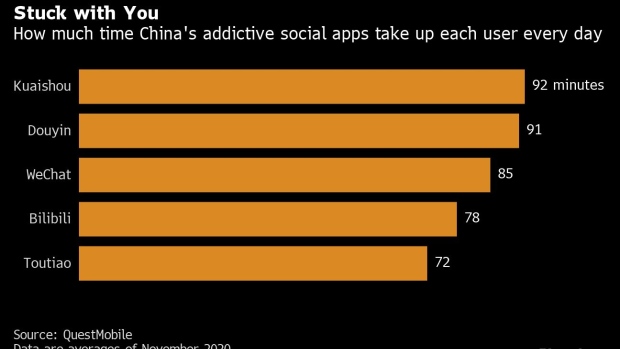Jan 20, 2021
Tencent Seeks Video Breakthrough After $240 Billion Lite App Hit
, Bloomberg News

(Bloomberg) -- WeChat creator Allen Zhang is counting on a breakthrough in video to thwart TikTok owner ByteDance Ltd., building on the success of his last big overhaul of the all-in-one messaging app.
Zhang, celebrated in China for inventing Tencent Holdings Ltd.’s signature creation, has toyed for years with ways to keep and expand WeChat’s industry lead, particularly as upstarts like Douyin -- the Chinese twin to TikTok -- began to surpass WeChat in user time-spent. Since 2017, mini apps -- the last significant WeChat innovation -- have blossomed into a $240 billion marketplace, with 400 million daily users doubling the amount they spent last year on transactions such as booking rides and buying groceries.
Through mini programs, WeChat has become intrinsic to the lives of over a billion people and is the backbone of the Chinese tech giant’s sprawling internet empire that spans social media, gaming and financial services. In his annual spiel to developers, Zhang signaled that the next chapter of the platform will be focused on short-form videos: an arena where Tencent is playing catch-up to nemesis ByteDance.
“In terms of self-expression and media consumption, our era is shifting toward videos,” Zhang said Tuesday in a two-hour speech at WeChat’s 10th anniversary developer conference.
The explosive growth in video has upended China’s social media landscape over the past four years, with Douyin accumulating 600 million daily users and cementing its position as the go-to for goofy lip-syncing videos. By September last year, ByteDance’s share of Chinese app users’ screen time had climbed to 15% from 12% a year earlier as Tencent’s dropped to 41% from 45%, according to researcher QuestMobile.
In response, the 51-year-old Zhang -- who commands a cult-like following in China thanks to WeChat’s influence -- first touted the app’s short-videos function during last year’s event in Guangzhou. Just like in Douyin, users of the Channels feature scroll through an endless stream of videos or photos recommended by algorithms. In just six months, the function had garnered 200 million daily active users, Zhang said on WeChat in June. Since then, it’s upgraded that function so users can also scout for nearby live-streamers and tip them with virtual coins.
Tencent has dabbled in short videos in the past, with mixed success. Its infamous “shark womb” culture has given birth to numerous products akin to Douyin, with its Weishi app making the biggest splash. It’s also an investor in Kuaishou, the Douyin competitor that’s said to be planning a $5 billion Hong Kong initial public offering this year.
Zhang devoted most of his speech this year to detailed discussions of Channels’ product design. While WeChat’s social feeds have been centered around words and long-form articles, many people find it easier to create content via videos, he said. Unlike rivals, Channels won’t lure influencers with cash prizes and both social networks and machine recommendations will play a part in deciding what content shows up on user feeds, he said. The company now has nearly 200 people working on the product, growing from just around 20 when it started, he said.
“It’s challenging for everybody to drive traffic to a new standalone app rather than making it part of their existing apps. That’s where Channels differs significantly from Weishi,” said Michael Norris, research and strategy manager at Shanghai-based consultancy AgencyChina. “WeChat is this piggy bank that drives new use cases. The question is why Tencent didn’t do that sooner.”
WeChat executives giving presentations on Tuesday showed how formidable the Chinese super-app is to just about every internet peer: about 300 million people now buy fresh produce through mini programs, signaling Tencent’s rapid inroads into the hottest sphere of online commerce. Roughly 800 million made use of its health code during the lockdowns, as the Chinese government sought to track people’s movements via apps to control the spread of the virus. Monthly active users for mini-program games alone surpassed half a billion.
Still, Tencent faces some headaches. The Chinese government has sent a warning shot to its technology giants by issuing wide-ranging guidelines against monopolistic practices on the internet from the sharing of sensitive information to alliances that squeeze out smaller rivals. While the crackdown has so far focused largely on areas such as e-commerce and fresh produce delivery, Tencent’s overwhelming leadership in gaming and social media may draw scrutiny.
WeChat, for its part, has established a so-called walled garden that controls what content and services its users can interact with. ByteDance, which has been eating away at Tencent’s lead in areas like social media and gaming, is among a number of rivals that have long complained about the platform blocking their services. The companies’ billionaire founders -- Zhang Yiming at ByteDance and Tencent’s Pony Ma -- have previously traded barbs and, as recently as this month, ByteDance senior executives publicly accused the larger company of blocking its offerings including Douyin and work app Feishu on WeChat.
There are signs Asia’s most valuable corporation is making tentative efforts to ease away from that closed ecosystem. WeChat is focused on opening up access to its mini programs this year, executives said Tuesday, and users can now access the lite apps through links sent via email and text messages.
As WeChat’s evolution and monetization become increasing visible, Tencent’s Zhang -- who has said he doesn’t think about the competition -- insists he’s sticking with his original product philosophy.
“Wechat is almost as simple as it was 10 years ago. There are lots of new functions, but we delivered these functions in the simplest way,” Zhang said, before wrapping up the night. “Maybe you don’t agree, but simplicity is beauty.”
©2021 Bloomberg L.P.





